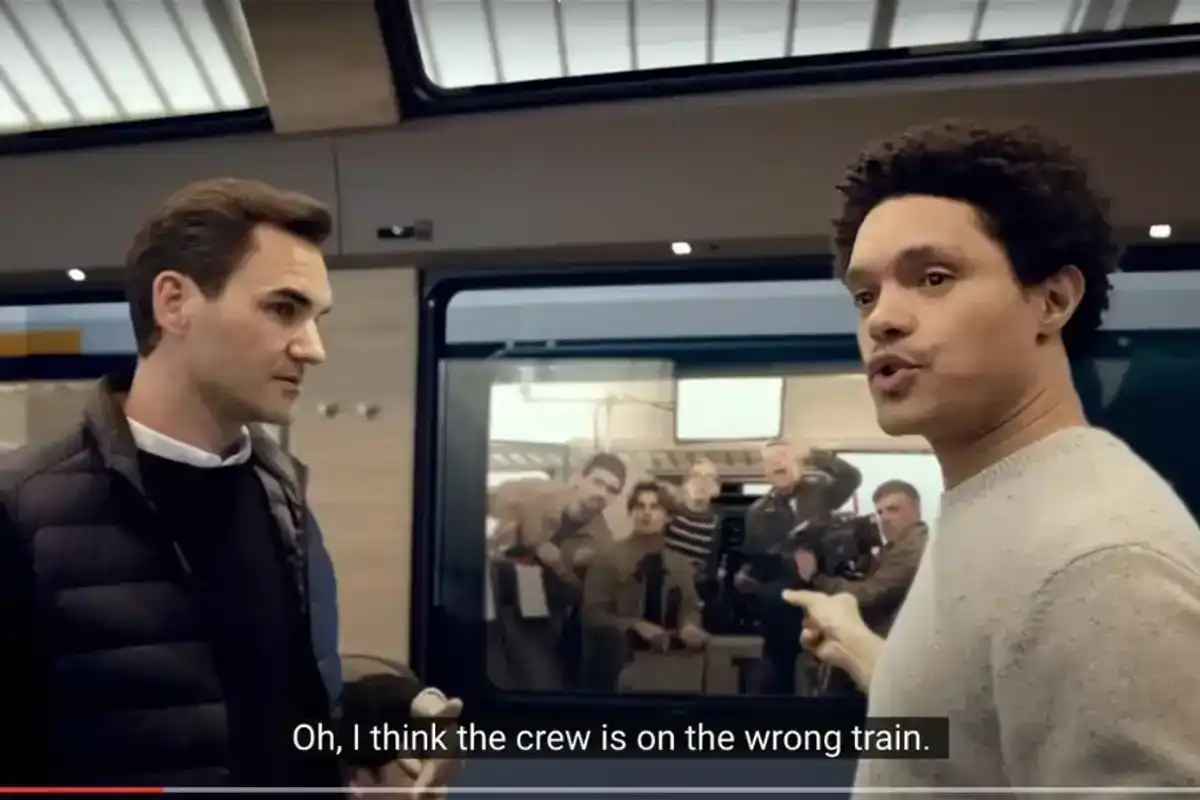Greatest tourism ad ever? Trevor Noah and Roger Federer board the 'wrong train.'
It's clever, funny, and incredibly effective.
Roger Federer and Trevor Noah filming a Swiss tourism ad.
What do you get when you combine comedian Trevor Noah, tennis legend Roger Federer, and the world famous clock-making, chocolate-brewing, Alpine-skiing symbol of neutrality, Switzerland?
Apparently, a delightfully charming train ride through the Swiss countryside and perhaps the greatest tourism ad ever made.
Both Noah and Federer shared a tourism ad they collaborated on for the Grand Train Tour of Switzerland, and people are loving it. It's one of those ads that people don't care is an ad because it doesn't really feel like an ad and it's so enjoyable to watch. (It's also incredibly effective—like, give us alllll the train rides through Switzerland, please.)
The ad plays like a mini-documentary of Noah and Federer filming a Swiss tourism ad gone wrong. The two men—both of whom are half-Swiss in real life—appear to hop on the wrong train while arguing about whether or not the ad they are filming is funny (or whether it even should be).
What follows is a tale involving Swiss punctuality, hospitality, and stunning natural beauty, all wrapped up in wholesome hilarity.
- YouTube www.youtube.com
Thousands of commenters chimed in with how enjoyable and effective they found the ad:
"This clip is brilliant and I am definitely going to travel on that train in Switzerland in the near future. Excellent work," wrote one commenter.
"Usually, I hate tourism ads because they're always so clichéd and unoriginal, but this one hooked me from the beginning," shared another. "Switzerland is such a beautiful country, and this ad singlehandedly convinced me so. Looking forward to this train ride sometime in the future! :)"
"This is criminally short!" wrote another. "I wish for a full hour! I can’t seem to get enough of them."
Noah and Federer shared their experience making the video with Financial Times, and their "behind the scenes" stories are as delightful as the ad itself.
- YouTube www.youtube.com
Federer, who is an official Switzerland Tourism Ambassador, shared how much he has enjoyed making Swiss tourism ads with Robert DeNiro, Anne Hathaway, and of course, Trevor Noah. He said the shoot with Noah brought him back to his own childhood.
"I was always on trains, leaving home, looking out of the window, seeing the trees and the fields go by and thinking, 'Will I be a good tennis player? Will I not? Will I win, will I not?'" he said.
Several parts of the ad point to how strict the Swiss are about being on time, and Noah shared that there were a few instances while filming when a train really did almost take off with them inside.

"They weren't even going to hold it for us," he said. "We were like, 'Oh, we're making an ad,' and then they were like, 'Yeah, and the train has a schedule.'"
"We were laughing," Noah said, imagining what would have happened if a train really had left with them on it. "Like, would that become the meta joke? Does that become the joke in the joke?"
This article originally appeared two years ago.

